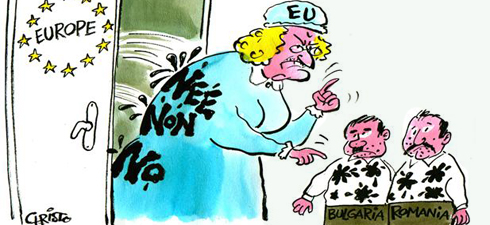Soon we will have to apologise for who we are. Several major European countries are very worried about the approach of 2014, the fateful year when Bulgarians and Romanians will no longer have any official restriction blocking their access to labour markets elsewhere in the EU. Some of these countries are already busy developing policies to prevent this from happening, thus ensuring that citizens of both of nations will definitively be categorised as second-class Europeans.
The Dutch initiative to compensate for "the mistake" of the premature accession of Bucharest and Sofia in 2007 by attempting to at least block Bulgaria and Romania’s access to the border-free Schengen Area has found vigorous support in countries like Germany, Belgium and Finland. With its campaign against the Roma, accompanied by an increasing distrust of Bulgarians and Romanians in general, France has also made its contribution.
But it is the United Kingdom which has clearly formulated what everyone else has in mind: that Sofia and Bucharest should formally remain in the EU — after all, it is not really possible to expel them — but with the proviso that their citizens will be required to apply for visas. In one fell swoop, the measure will dispel Dutch misgivings over the abolition of internal borders, French disgust at the influx of foreign Roma and British fears about the loss of the UK’s most precarious and worst paid jobs.
London has cranked up its bureaucratic machine
There was nothing fortuitous about the near simultaneous occurrence of two recent events. On 7 October, British Home Secretary Theresa May literally tore up the European contract on the free movement of people, when she proposed that this right should be abolished for citizens of "certain countries". It was clear to everyone that she meant Bulgaria and Romania. The following day, Bulgarian MEP Ivaylo Kalfin (Socialist Party) made public the response of Employment and Social Affairs Commissioner László Andor in answer to his 11 July question about discrimination against Bulgarians and Romanians in the UK. "Nothing to report" was in substance Brussels’ conclusion after two months of reflection on the subject.
Nonetheless, the facts are there; it’s just a matter of facing up to the reality. Since the beginning of this year, London has cranked up its formidable bureaucratic machine to pulverise foreign job seekers, dragging out authorisation procedures beyond the regulatory six months, and systematically rejecting Bulgarians and Romanians who are sent back into the doldrums of the black economy.
The United Kingdom is one of ten countries to have postponed opening its labour market to the citizens of the two most recent arrivals in the EU for the maximum period of seven years. And the reason? A massive influx of Bulgarians and Romanians is apparently a threat to the stability of the British job market. According to Eurostat, there are some five million foreigners working in the UK, of whom only 15,000 are Bulgarians. Many analysts estimate that the real figure is in fact much higher, but a country of 63 million people is hardly likely to experience their presence as a burden. Forced to accept self-employed worker status, which effectively means that they will earn less than the minimum wage and not be covered by UK health insurance, they are only competing with other poverty stricken migrants like themselves.
Bulgarians should focus anger on their own leaders
A recent BBC investigative report showed the true face of this system, filming the tribulations of a Romanian chambermaid. When the young woman asked why she was paid only a third of the minimum wage, the employment agency administrator tore up her contract and showed her the door.
For honest Bulgarians, this discrimination is doubly painful because Europe is punishing them for their suffering in Bulgaria itself. Other member states are attempting to close the only exit from the crisis that has reigned here for the last 20 years — the departures terminal of Sofia airport, which has long been a symbol of the hope that life, no matter how bad it is at home, can start again under more clement skies. Close to a million young people have already left Bulgaria and others dream of following in their footsteps. The closing of borders will inevitably give rise to anti-European sentiment in the country while aggravating domestic problems. Potential emigrants will respond by setting their sights on New World countries, but how can this be expected to reinforce the identity or the strength of the new Europe?
It’s clear that Bulgarians should first and foremost focus their anger on their own leaders who are not only responsible for the misfortunes of their country, but also for its poor image elsewhere in the world. Our Prime Minister Boyko Borisov, whose providential aura abroad is not what it used to be, could possibly ask his British opposite number, David Cameron, if that is how he sees their friendly relationship, which was so carefully staged on 7 August in London. Aren’t they supposed to be wonderful pals? "David and I have agreed…" "I said to David…" trumpeted Borisov in the wake of his visit to Downing Street. Now all he has to do is to pick up his phone and tell him: "Listen David, enough is enough!"
Was this article useful? If so we are delighted!
It is freely available because we believe that the right to free and independent information is essential for democracy. But this right is not guaranteed forever, and independence comes at a cost. We need your support in order to continue publishing independent, multilingual news for all Europeans.
Discover our subscription offers and their exclusive benefits and become a member of our community now!












